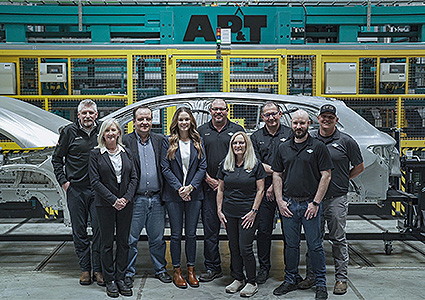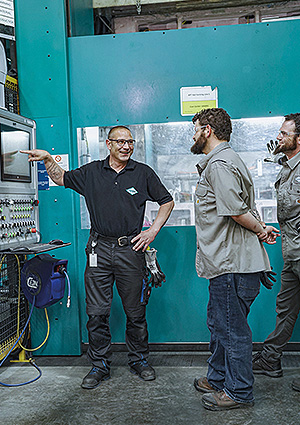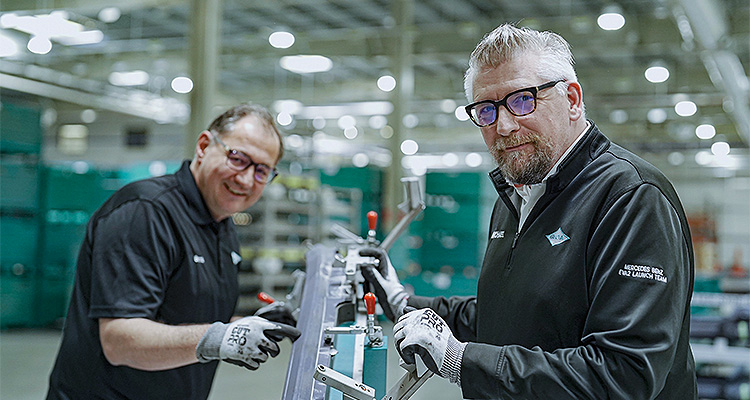GEDIA USA Holdings’ President recounts establishing its Georgia facility against the odds
Although GEDIA Automotive Group (GEDIA) was founded as a jewelry manufacturer in 1910, it was not long before the company expanded its facilities to serve a range of other sectors. One thing that has never changed however, is the business’ family-owned status, which still resonates within its conservative approach to growth and success. Today, the enterprise develops and manufactures car body parts such as underbody, structural, crash, and chassis components for the automotive industry, and operates in Europe, North America, and Asia. Manufacturing Today catches up with Michael Lehmann, President of GEDIA USA Holdings, to hear more about his journey thusfar, since joining the organization in 2020.
 “As president, I oversee the operations of our two US plants, one in Michigan and one in Georgia,” Michael starts. “We have around 4400 employees working for us across eight countries: Germany, Spain, Hungary, Poland, China, India, Mexico, and the US. Even though we have worked in many different sectors over the years, GEDIA is now known as an expert in developing and producing complex multi-material structural body and chassis components made out of in-house hot and cold stamped parts used for all kinds of applications in the automotive industry. Here at our Georgia location, we are primarily focused on supporting Mercedes-Benz’s US production arm.
“As president, I oversee the operations of our two US plants, one in Michigan and one in Georgia,” Michael starts. “We have around 4400 employees working for us across eight countries: Germany, Spain, Hungary, Poland, China, India, Mexico, and the US. Even though we have worked in many different sectors over the years, GEDIA is now known as an expert in developing and producing complex multi-material structural body and chassis components made out of in-house hot and cold stamped parts used for all kinds of applications in the automotive industry. Here at our Georgia location, we are primarily focused on supporting Mercedes-Benz’s US production arm.
Enhancing safety
“GEDIA USA is equipped to facilitate both cold and hot stamping. Cold stamping is exactly how it sounds, we press cold steel from a coil or blank into shape. Hot stamping requires the blanks to be heated to approximately 930 to 960 degrees Celsius before forming. The rapid cooling in the forming die produces a martensitic structure of the material with an extremely high tensile strength. These parts are mainly used for body components to protect the occupant in the vehicle in case of an impact. What makes us unique compared to other hot stampers is the fact that we are using an additional process step called TemperBox. With the help of this additional step we are able to apply different material properties in different sections of the component. This comes in handy to achieve a certain crash behavior, for example a B-Pillar to further enhance the safety aspect for all occupants in the vehicle. Overall, it’s a very neat process that allows us to utilize thinner raw materials to ultimately save weight in the final product, which is a key feature in automotive production.”
Steady growth
The Mercedes-Benz contract was actually obtained before Michael took up his role in April 2020, and was the initial instigator behind the decision to develop the Georgia location. However, the road to completion was by no means straightforward, as he details: “We received the purchase order from Mercedes in December 2019, and committed to building a plant somewhere in the southern states to facilitate it, just as everyone finished work before the Christmas holidays. Shortly after the team returned in January, they discovered that GEDIA had been the victim of a cyber-attack.
“This was obviously not ideal, given the surrounding circumstances,” he continues. “Especially when you’re trying to embark on such an important project, as there was literally no time to spare. Everything went down for a brief period as a result, and, unfortunately, we weren’t yet aware what Covid was going to do when it reached us, in terms of the severe travel restrictions and the effects it would have on our projects. The odds were truly against us, and our customer was becoming increasingly more nervous.
“We are not Apple or Google, and only have a finite amount of human resources, so we had to rely on our colleagues from Europe,” Michael continues. “As soon as people were allowed to travel, we applied for 70 or so visas to get everyone over. We were also very lucky in the partnerships that we formed during the build, such as those with United Grading and Shimizu in the US, AP&T from Sweden, AWL from the Netherlands, and then Lewa and Trumpf from Germany. The latter four are all equipment suppliers, and I have to say, even though they had to battle the struggles of moving people from Europe during Covid, they did absolutely everything they could to support us every single day. I’m so incredibly proud of the entire team, because everything worked out well in the end. Besides our partners we already mentioned, the great support we received from governmental institutions starting at the local county level with Carl Campbell and Ali Harp, through our friend Commissioner Pat Wilson and ultimately Governor Brian Kemp was another important ingredient for our success story. And last but not least, the support from our customer MBUSI and here in particular James Hans, Brian Rooney, and Michael Clagett throughout the entire journey was also pivotal to reach our common goal.”
 In its completed form, the Georgia plant covers 180,000 square feet on a 55-acre lot, giving GEDIA the capacity to expand by up to 500,000 square feet over the coming years. “The sole reason as to why we are here is to aid the production of the new Mercedes-Benz EQS and EQE SUV, which are both truly beautiful cars, but at the same time, we don’t want to focus on a single customer only. We are currently in talks with some local OEMs to diversify our output further, which will be the next step for GEDIA USA.
In its completed form, the Georgia plant covers 180,000 square feet on a 55-acre lot, giving GEDIA the capacity to expand by up to 500,000 square feet over the coming years. “The sole reason as to why we are here is to aid the production of the new Mercedes-Benz EQS and EQE SUV, which are both truly beautiful cars, but at the same time, we don’t want to focus on a single customer only. We are currently in talks with some local OEMs to diversify our output further, which will be the next step for GEDIA USA.
“GEDIA is still a family-owned company, and it operates as such. We are pretty conservative when it comes to investments and growth, because we want to be here for the long haul. We don’t see ourselves as a big guy, our group revenue last year was roughly €760 million, and I love this element about the business. We don’t jump on everything as soon as it appears, but tend to wait and sort through our options to see what makes the most sense to grow the enterprise in a timely and secure manner. The Georgia plant is a great example of this, building up a facility in time, and hitting all of the notable milestones on the way. This is exactly what GEDIA stands for, and what it can offer, and I am very proud of all of my colleagues across the world, who have supported us in getting to where we are today,” he concludes.
